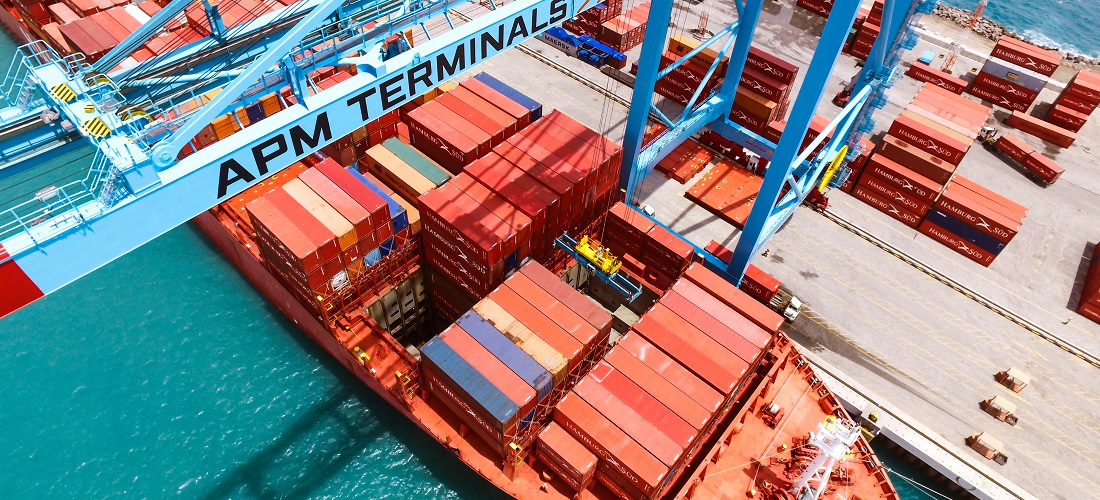
APM eyes Saboó container terminal as a way to expand operations in Santos
Oct, 01, 2020 Posted by Ruth HollardWeek 202040
According to Leo Huisman, CEO of APM Terminals in Latin America, the company – which is a subsidiary of the Danish shipping Maersk – wants to increase its operations in the Port of Santos. Therefore, it has been closely monitoring the opportunities involving a new container terminal in Saboó. Huisman granted an exclusive interview to Estadão’s Broadcast column on the topic.
The project for the new terminal is part of the Port of Santos Development and Zoning Plan (PDZ). The area to be offered to the market is next to the facilities of Brasil Terminal Portuário (BTP), which is a partner of APM. The group plans to hitch a ride on the ambitious plans for the Port of Santos and envisions creating a hub capable of receiving ever-larger vessels in the future.
“We want to increase our operations in Santos. We believe it is a necessity, but we are in a difficult time”, he said. He explained that advances in port structures depend on international technology and that, due to the devalued Brazilian real, projects end up becoming much more complex.
Today, BTP’s structure operates at maximum capacity in Santos. “Everyone expects the Saboó area to be auctioned. Let’s see if we can and should participate ”. Studies for the area are still in an embryonic phase at the Santos port authority (SPA) and there is no timetable for the project.
“In about five or 10 years, Santos will be able to receive larger ships. When these large vessels arrive, they do not stop at all ports. They need hubs to distribute the cargo,” he said.
Today, the BTP terminal has a capacity of 1.7 million TEUs per year. To receive larger vessels, the capacity will have to reach close to 3 million TEUs. “It is not for tomorrow. It is not for next year. But we know that we would like to improve services for larger vessels ”, he said. From January to August, BTP handled 689,089 containers, up 13% YoY. The gain came prior to the good moment for exports, which advanced 38% in the period, supported by commodities and animal protein.
The Port of Santos can currently dock vessels of up to 340 meters. SPA plans to receive vessels of up to 366 meters in the coming months. The project is being evaluated for approval by the Navy. The port itself sees approval as an important step towards its consolidation as a hub.
APM’s entry into the dispute for Saboó, however, is still full of uncertainty. In a recent auction of two pulp terminals, Suzano ended up being left out because of a public notice rule to avoid the concentration of more than 40% of pulp handling and storage with a single operator. With another terminal, Suzano could account for 70% of participation. “The question is: where in Brazil will the main distribution take place? Ideally, it would be in a large market like Santos. But if Santos cannot offer the structure, the vessels will go elsewhere in the country ”.
The group closely monitors the Brazilian market. Huisman explained that while container movements are expected to decline by up to 30% in Latin America, especially in countries like Panama and Argentina, Brazil will be able to deliver growth of up to 4% this year. “We knew that the impact would be great. Many economies have closed. What took us a little by surprise was the significantly higher level of Covid-19 infections in Latin America,” he said.
While the company recorded a drop of around 20% in volume in the second quarter in the region, today the operation is unable to meet the high demand for transportation. Among the engines driving this demand is the Chinese market. “At the moment, we are having more demand than we can deliver, yes. Because it is not possible to divide demand equally throughout the year. It was predictable that this would happen, that there would be very high demand. We have seen this happen during other crises.”
In Brazil, the support came from the agribusiness gigantism, whose exports of fruit and animal protein more than made up for the drop in imports, especially in the automobile sector.
Despite keeping a watchful eye on the country, APM has no plans for new projects and prefers to expand the existing portfolio. In addition to the partnership with BTP, the company also leases terminals in Pecém, CE focusing on fruit exports, in Itajaí, SC, and also holds a stake in Itapoá, SC.
Source: Estadão
-
Other Cargo
Mar, 24, 2020
0
Maersk to help cotton exporters by providing end-to-end intermodal services
-
Meat
Aug, 01, 2023
0
Saudi Arabia allows imports of caprine animals from Brazil
-
Economy
Dec, 23, 2022
0
Milder prices to bring Brazilian import values down a notch, says Inter
-
Shipping
Nov, 23, 2023
0
Maersk halts operations in Syria


